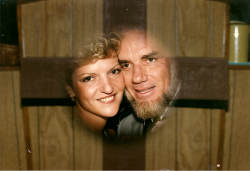When the governor motioned for him to speak, Paul replied: "I know that for a number of years you have been a judge over this nation; so I gladly make my defense. You can easily verify that no more than twelve days ago I went up to Jerusalem to worship. My accusers did not find me arguing with anyone at the temple, or stirring up a crowd in the synagogues or anywhere else in the city. And they cannot prove to you the charges they are now making against me."
Thoughts for Today:When I was growing up, my younger brother was the biggest pest on the face of the earth. One of his favorite things to do was to sneak up on my older sister and I -- slap, pull hair, or pinch one of us -- then run from the room laughing. He would continue to do this until one of us would stop what we were doing and give chase.
Unfortunately for my sister and I, when we gave chase he would immediately start crying while running to my Mom or Dad and say, "Mike and Nancy are picking on me!" The evidence of an angry older brother or sister chasing a tearful sibling would seem to support his testimony. So, invariably, we would be chastised and sometimes punished, until one fateful day when my Dad observed the whole story. Needless to say it was the last time one of my parents came to my brother's defense. If only in life we were able to find justice as easily.
In our passage today, Paul begins his own defense, but rather than use words of flattery like Tertullus did, he gives a statement of fact about Felix: "for many years you have been a judge over this nation." He then recounts the exact details of the charges made against him. While there had indeed been riots in Jerusalem while Paul was there, the charges that he caused them must be proven.
Questions to Ponder:The lesson many learn from Paul's experience (or our own similar ones) is to not get involved. That's especially true in today's culture where so often people are afraid of confrontation. After all, if Paul hadn't gone to Jerusalem in the first place he wouldn't have been in trouble. If he hadn't gone to the temple he couldn't have been accused of defiling it. If he hadn't spoken about Jesus he wouldn't have been attacked. But are those really the lessons God would have us learn from the passage, or even from our own experiences? Have you learned the wrong lesson from anything in your past that has made you more timid, skeptical or afraid? Paul tells us in 2 Corinthians 3:12 where his boldness comes from, "since we have such a hope [in Jesus], we are very bold."
My Dad taught me through my childhood experience with my brother to have faith that justice would ultimately prevail and to not (in frustration) take matters into my own hands. What I have learned as an adult is justice may not come in this life, but that shouldn't stop me from living "boldly" for Christ. What lessons have you learned that need to be maturely rewritten?





 RSS Feed
RSS Feed
